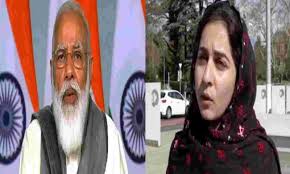Baloch activist Karima Mehrab called Indian Prime Minister Modi ji asher brother and urged him to be the face of “Baloch genocide, war crimes and human rights violations in international fora.”
On Monday night, Karima Baloch was found dead in Toronto, Canada, where she had been staying since 2015, seeking political asylum. The 32-year-old was last seen on December 20, when the Toronto Police tweeted.
Karima, the first woman chairwoman of the Baloch Students Organization (BSO-Azad), was born in Balochistan, Tump, to a politically activist family that produced a number of influential nationalist figures such as Wahid Qambar and the late Khalid Baloch.
While Pakistan prohibited the BSO-Azad, Karima consistently dismissed the idea that the group sponsored aggression in order to accomplish its political objectives. She has also accused Pakistan of fostering extremist Islamic forces in the Baloch areas in order to fight the nationalist trend and to curtail women’s rights.
“Her journey with the BSO started in 2006 when she was a student at Atta Shad College in Turbat. It was a turbulent year in Balochistan politics when Musharraf’s government killed influential Baluch tribal leader Nawab Akbar Bugti in August, which triggered provincial demonstrations throughout the country. Given her constructive involvement in the BSO, she quickly achieved popularity within the organisation. In 2014, after being elected as the first female chair of the BSO, she made history.
It was mentioned by the BBC in its prestigious 2016 100 Most Inspirational and Influential People. “The national liberation movement without the participation of women is incomplete,” BBC said.
In a 2016 interview, Karima said she was forced into politics by the political situation in Balochistan.
“I never dreamed about being a politician when I was growing up. I’ve been more interested in arts and psychology. It’s clear that when you’re raised in a world that’s hurting, you see it all. M
Malik Siraj Akbar, a Pakistani journalist based in the US and editor of Baluch Hal, told that, “Karima stood out in Balochistan’s politics as the first female leader of the Baloch resistance movement. Not many women in Baloch culture get out of their homes. Not only did she rally the women of her region, but she also led the men in the fight against the policies of Pakistan in Balochistan.” She was vocal, fearless, and consistent in her resistance despite facing severe opposition from the Pakistani military and its intelligence agencies. One of her uncles had previously been killed by the Pakistani security forces and the home was targeted but that did not deter her from her mission. She was deemed as a powerful Baloch voice even in exile,” Akbar said.
Akbar said he believed that with her death, the Baloch movement has got its biggest female icon yet. “She will be remembered and seen by many young Balochs, both boys, and girls, as a role model and a symbol of resistance even if they would not fully endorse her politics simply because there are not many women like her in Balochistan or Pakistan who would be willing to sacrifice everything for their political beliefs and call out the powerful Pakistani military in such an open way,” Akbar said.
Meanwhile, rights group Amnesty International tweeted, “The death of activist #KarimaBaloch in Toronto, Canada is deeply shocking and must be immediately and effectively investigated. The perpetrators must be brought to justice without recourse to the death penalty.”
Karima is the second high-profile Baloch activist living abroad to be killed this year. In March, Baloch refugee and journalist Sajid Hussain was found dead in the Fyris River near Uppsala, Sweden. He had been missing for days before his body was found.
Reporters without Borders (RSF), a Paris-based journalists’ organisation, alleged that Hussain’s mysterious disappearance and subsequent death could have been organised by the Pakistani intelligence agencies – ISI and MI – due to his work as a journalist.


1 Comment
Wow! Finally I goot a weblog from where I be able to truly obtain helpful facts regarding
my study and knowledge. https://u7bm8.mssg.me/